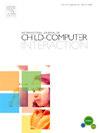儿童和青少年在玩教育数字游戏时会做些什么?
Q1 Social Sciences
International Journal of Child-Computer Interaction
Pub Date : 2024-10-11
DOI:10.1016/j.ijcci.2024.100694
引用次数: 0
摘要
我们研究了四年级至七年级学生在玩数字游戏时所报告的行为,以及他们在玩游戏后对这些行为的反思。学生们被随机分配到三个条件中的一个,在这三个条件中,参与者要思考他们在玩游戏时学到了什么(元认知条件);思考他们有多喜欢这个游戏(情感条件);或者没有目标(控制条件)。然后,训练学生在连续 10 分钟玩编码游戏时大声思考。游戏结束后,学生们指出他们在游戏中学到了什么,记住了什么。所有评论都经过编码,以反映认知过程、游戏的具体内容以及参与者对游戏或游戏过程的评价。与低年级学生相比,六年级和七年级学生的表现更好,提及认知过程的次数也更多。在情感条件下的学生比在控制条件下的学生表现更差。在游戏过程中,七年级学生比四年级学生更多地提及认知过程。值得注意的是,在所有参与者中,关于如何玩游戏的规则的参考出现了最初的高峰,然后立即下降。总之,研究结果阐明了学前和早期青少年如何思考他们基于游戏的学习,这可能会为他们如何在游戏情境之外使用这种学习提供参考。本文章由计算机程序翻译,如有差异,请以英文原文为准。
What do children and early adolescents say they do when playing an educational digital game?
We examined fourth through seventh graders' reported behaviors while playing a digital game and their reflections about those behaviors after playing. Students were randomly assigned to one of three conditions in which participants were to think about what they were learning while playing (metacognitive); about how much they liked the game (affective); or no goal (control condition). Students then were trained to think aloud as they played a coding game for 10 consecutive minutes. Following gameplay, students indicated what they learned and remembered while playing. All comments were coded for reference to cognitive processes, specific game aspects, and participants’ evaluations of the game or their gameplay. Sixth- and seventh-graders outperformed and made more references to cognitive processes than the younger students. Those in the affective condition performed worse than those in the control condition. Seventh graders referenced cognitive processes more than fourth graders during the game. Notably, across all participants reference to rules about how to play the game showed an initial spike and then immediately decreased. Overall, the findings elucidate how pre- and early adolescents may think about their game-based learning, which may inform how they use that learning outside game contexts.
求助全文
通过发布文献求助,成功后即可免费获取论文全文。
去求助
来源期刊

International Journal of Child-Computer Interaction
Social Sciences-Education
CiteScore
7.20
自引率
0.00%
发文量
73
 求助内容:
求助内容: 应助结果提醒方式:
应助结果提醒方式:


